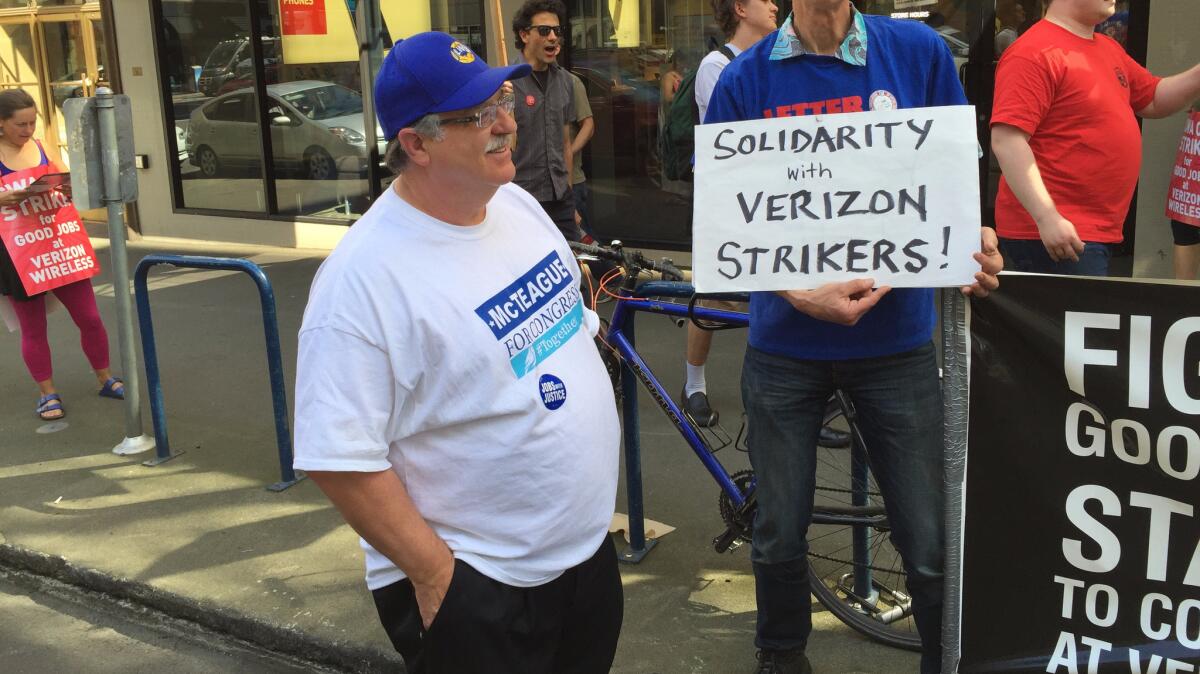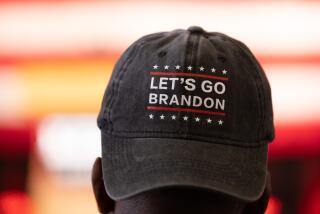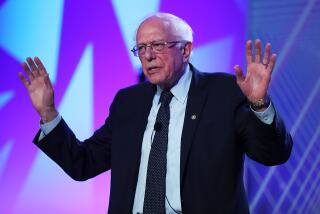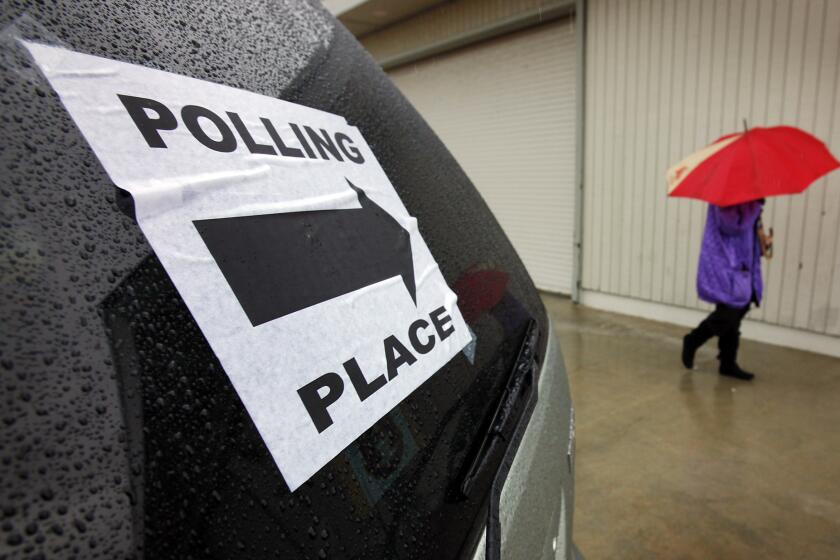How deep is Bernie Sanders’ progressive movement?

Reporting from Portland — Dave McTeague has never met Bernie Sanders, but he’s latched onto him with the fervor of a religious acolyte.
McTeague, a self-described “rabble-rouser and Democratic activist,” was inspired by the Vermont senator’s presidential campaign to launch his own underdog bid for a congressional seat in Oregon.
Just like Sanders, McTeague is casting himself as the liberal alternative to a more moderate opponent, and he’s even adopted a symbol linked to the senator. After a little bird landed on Sanders’ podium during a speech in Portland, delighting the candidate’s fans, McTeague added a picture of a bird to his campaign logo.
On Thursday, wearing a large white campaign T-shirt and a longshoreman union cap, he was walking a picket line outside a Verizon store to protest the corporation’s worker policies, much like Sanders had done.
He called for a political revolution. Well, here I am.
— Deve McTeague
“He called for a political revolution,” said McTeague, 63, who previously served for 10 years as a state representative. “Well, here I am.”
Even though Sanders is facing long odds in his bid to wrest the Democratic presidential nomination from Hillary Clinton, he continues to fire up activists who are flocking to his call for a more uncompromising brand of liberalism. As candidates in Oregon, Florida, California and elsewhere around the country try to capture some of his unruly political magic, the question is whether the progressive movement Sanders has championed is broader and deeper than just a presidential primary, and whether it could lift candidates for other offices as well.
See more of our top stories on Facebook >>
McTeague is one benchmark as he runs to represent a massive, politically diverse district that stretches from the Portland suburbs to the Oregon coast. The state’s primary is Tuesday, and other candidates are hoping that Sanders’ presence on the ballot will give them a boost.
“This is a great test to see if it has legs to spread out into the larger Democratic community,” said Jim Moore, a political science professor at Pacific University.
“He can’t be the darling of Portland and Seattle and San Francisco and Boulder and say he’s got a movement,” Moore said of Sanders.
Despite conservative rural areas, Oregon’s politics is dominated by a growing and very liberal Portland. Supporters packed the city’s 19,000-seat basketball arena in August to see Sanders, and one of his campaign’s field offices is adorned with a mural of the candidate calling for “revolution in the Rose City.”
“If you could pick a handful of states where Sanders could sustain his movement, Oregon would be one of those places,” said Brent Walth, a journalism professor at the University of Oregon who has written about politics in the state.
U.S. Sen. Jeff Merkley, an Oregon Democrat and the only one of Sanders’ colleagues to endorse him, said voters, especially young ones, will continue pushing for aggressive change as they struggle with the cost of education and stagnant wages.
“I don’t think this is a wave that crashes on the floor and dissipates,” he said. “The fundamental frustration that’s driving it is going to keep on going.”
Election 2016 | Live coverage on Trail Guide | Track the delegate race | Sign up for the newsletter
Politicians in California, which holds its primary June 7, have definitely taken note. The two Democratic candidates in the U.S. Senate race, state Atty. Gen. Kamala Harris and Rep. Loretta Sanchez, are making pitches to Sanders’ supporters in their advertising. Harris touts support from Sen. Elizabeth Warren (D-Mass.), an influential progressive leader, while Sanchez emphasizes her push for a $15-per-hour minimum wage and her votes against the Iraq war and the Wall Street bailout.
Other California candidates have been even more explicit. William Ostrander, a San Luis Obispo hay farmer running for Congress in his Central Coast district, ordered bumper stickers that read “Feel the Bill,” playing off a popular Sanders slogan, “Feel the Bern.”
In South Florida, law professor Tim Canova is taking direct aim at the Democratic establishment, and he’s finding many are willing to open their wallets to help. He recently announced that he’s raised $1 million in his bid to unseat Rep. Debbie Wasserman Schultz, the chair of the Democratic National Committee who many Sanders supporters feel has unfairly tilted the presidential primary process in Clinton’s favor.
There are plenty of activists who are eager to carry the progressive banner in other contests.
“We need to be identifying city council members and state representatives and voting for them now,” said Mandalynn Harbert, 27, a doula who lives across the state line in Washington but volunteers for Sanders in Portland. “If we’re electing people at every level,” she said, they can start to enact Sanders’ proposals.
Harbert wants to be a delegate at the Democratic convention in July. But not everyone who supports Sanders, who has spent his congressional career as an independent before running for president as a Democrat, is interested in changing the party from the inside.
“Some people are just so fed up with the Democratic Party, they don’t want to interact with them,” said Sandy Krebs, 53, who is trying to convince more Sanders followers to get involved with local politics.
There are reasons to be skeptical that Sanders can truly usher in the “political revolution” that he’s championed. For starters, it’s unlikely that Sanders will win the Democratic nomination.
“It’s happened rarely in American politics, where a movement grows out of defeat,” Walth said.
In addition, transferring the excitement surrounding a White House contest to down-ballot races is a difficult task.
“Presidential campaigns attract a lot of people that a lot of other campaigns can’t attract,” said Kari Chisholm, a Portland-based Democratic political consultant. “County commission races and state legislative races in the suburb just don’t have the same kind of sex appeal.”
The same could be said of the Portland mayor’s race, where there’s little sign of a Sanders-style insurgency. The leading candidate, Ted Wheeler, is the state treasurer who was once registered as a Republican. He describes himself as a progressive, something of a requirement when running for office in this city, with a strong government track record, something that has been out of fashion in this election cycle.
He has raised the most money of any candidate, and if he wins more than half the vote Tuesday, he can avoid a runoff. A recent poll from DHM Research, a Portland firm, showed him with 33% support, and 39% of voters were undecided.
Other mayoral candidates have trailed in the race, including Jules Bailey, a county commissioner who limited donations to $250, and Sarah Iannarone, who has never held elected office. It’s a much different scene from 2004, when Democratic presidential candidate Howard Dean dropped out of the race and his supporters banded together to help elect insurgent Tom Potter as Portland’s mayor.
“We don’t see that movement anymore,” said Moore, the political scientist.
Political observers said national trends don’t always sway the race for mayor, which can be more focused on local concerns like transportation and the cost of housing. But they’re watching to see if there’s a Sanders bump in the primary here. Iannarone is counting on it, and thinks she could benefit.
“The fervor for Bernie is not surprising,” she said, while stopping by an organic frozen yogurt shop that was helping to raise money for her campaign. Her denim jacket was dotted with buttons, including her own, which features a drawing of Portland’s Tilikum Crossing, a bridge that doesn’t allow cars. “This is a city that likes to do things different.”
Bailey spent a recent morning waving to commuters as they drove or biked downtown.
Although he’s also expecting higher voter turnout because of the contested presidential primary, he doesn’t expect a paradigm shift.
“Bernie Sanders doesn’t mean the end of traditional politics,” Bailey said. “There’s a reason Bernie Sanders is the insurgent against the establishment.”
The Sanders campaign team has been focused on its own race here, and Sanders hasn’t endorsed candidates in competitive Democratic primaries.
That means McTeague hasn’t received any kind of official nod from Sanders, although he’s made himself a fixture at the senator’s campaign events.
When Sanders spoke in Salem last week, McTeague worked the line of people waiting to get in, shaking hands and asking for their support.
“The voters know that I’m with Bernie,” he said.
The incumbent McTeague is trying to unseat, Rep. Kurt Schrader, is a member of the Blue Dog Coalition, a group of Democratic representatives who lean conservative on fiscal issues. Although Oregon’s 5th District has a reputation for moderate politics, McTeague is banking on a silent liberal majority.
“There’s a lot more progressive feelings out there than they give it credit for,” he said.
And if not this year?
“We’re building a progressive network and we’re not going to let it evaporate,” McTeague said. “If Bernie is not the nominee, he’s going to continue to lead a movement. And we’re not going away.”
ALSO
What a post-Trump Republican Party might look like
Billionaire-backed campaign launched to raise California’s tobacco tax
Twitter: @chrismegerian
More to Read
Get the L.A. Times Politics newsletter
Deeply reported insights into legislation, politics and policy from Sacramento, Washington and beyond. In your inbox three times per week.
You may occasionally receive promotional content from the Los Angeles Times.











